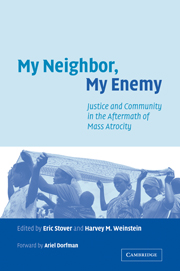Book contents
- Frontmatter
- Contents
- List of contributors
- Foreword by Ariel Dorfman
- Acknowledgments
- Introduction: conflict, justice and reclamation
- Part I Institutional approaches to justice
- 1 A world unto itself? The application of international justice in the former Yugoslavia
- 2 Legal responses to genocide in Rwanda
- 3 Localizing justice: gacaca courts in post-genocide Rwanda
- 4 Exhumation of mass graves: balancing legal and humanitarian needs
- 5 Witnesses and the promise of justice in The Hague
- 6 Reparations in the aftermath of repression and mass violence
- Part II Social reconstruction and justice
- Part III Survivors and justice
- Conclusion: a common objective, a universe of alternatives
- Index
4 - Exhumation of mass graves: balancing legal and humanitarian needs
Published online by Cambridge University Press: 05 May 2010
- Frontmatter
- Contents
- List of contributors
- Foreword by Ariel Dorfman
- Acknowledgments
- Introduction: conflict, justice and reclamation
- Part I Institutional approaches to justice
- 1 A world unto itself? The application of international justice in the former Yugoslavia
- 2 Legal responses to genocide in Rwanda
- 3 Localizing justice: gacaca courts in post-genocide Rwanda
- 4 Exhumation of mass graves: balancing legal and humanitarian needs
- 5 Witnesses and the promise of justice in The Hague
- 6 Reparations in the aftermath of repression and mass violence
- Part II Social reconstruction and justice
- Part III Survivors and justice
- Conclusion: a common objective, a universe of alternatives
- Index
Summary
History counts its skeletons in round numbers.
A thousand and one remain a thousand as though the one never existed.
Wislawa SzymborskaOver the past ten years, a growing tension has emerged between the humanitarian needs of families of the missing and the evidentiary needs and limitations of international war crimes tribunals in the aftermath of mass killings. On the one side are families who wish to know the fate of their missing relatives and, if they have died, to receive their remains. In their work exhuming mass graves in thirty-one countries, Argentine forensic anthropologists Mimi Doretti and Luis Fondebrider have found that “families have a desperate need to recover the remains so that they may properly bury them and close – if only partially – the circle of uncertainty.” On the other side are international war crimes tribunals, which are charged to investigate large-scale killings but which may lack the resources or political will to undertake forensic investigations aimed at identifying all of the dead. When a tribunal does levy charges of genocide or crimes against humanity – the two most heinous of all state-sponsored crimes – against suspected high-level perpetrators of mass killings, personal identification of the victims may not be a necessary part of a legal investigation. The charge of genocide, for example, requires that the prosecution prove that the alleged perpetrators committed acts with the intent “to destroy, in whole or part, a national, ethnic, racial or religious group.
- Type
- Chapter
- Information
- My Neighbor, My EnemyJustice and Community in the Aftermath of Mass Atrocity, pp. 85 - 103Publisher: Cambridge University PressPrint publication year: 2004
- 7
- Cited by

